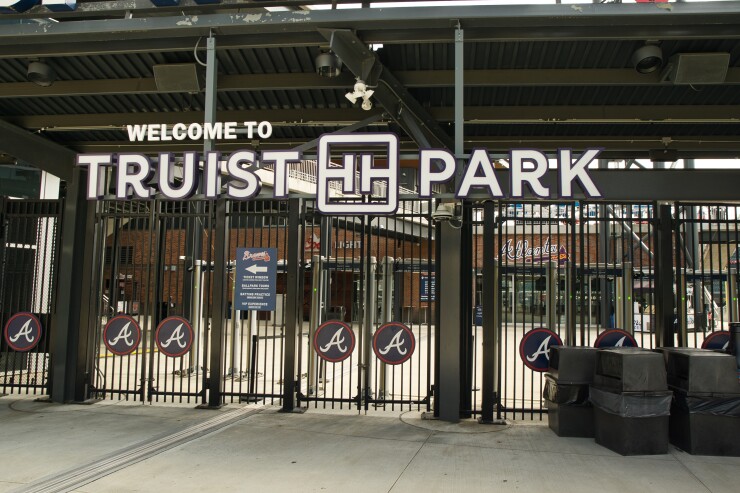Baseball is back in full swing. So are sponsorship deals for banks looking to capitalize on the game’s enduring appeal.
Only two years ago, banks were
Truist Financial marked the opening week by deepening its relationship with the Atlanta Braves, the defending World Champions. Truist, which is based in Charlotte, North Carolina, plans to relocate the national headquarters of its Truist Securities unit to a 250,000-square-foot building under construction in the Battery Atlanta development adjacent to Truist Park. Truist Securities’ new headquarters will be situated approximately 300 feet from home plate when it opens in 2024.
The $541 billion-asset Truist has held the naming rights to the Braves’ ballpark since 2020, when it acquired those rights as part of its
Last month, Capital One Financial in McLean, Virginia, signed a deal with Major League Baseball that makes the $432.4 billion-asset institution the sport’s official bank and credit card partner, as well as presenting partner of the World Series, baseball’s season-ending, signature event.
If
Community and regional banks are also spending more on baseball marketing.
Provident Financial in Iselin, New Jersey, announced a deal this week with the radio company Audacy and the Yankees' broadcast network to gain exclusive sponsorship rights to the Yankees broadcast booth. Robert Capozzoli, the $13.8 billion-asset bank's senior vice president and chief marketing officer, said the deal “took a lot of budget adjusting." He did not disclose its actual cost.
Whatever it paid, the bank will get its value, Capozzoli said in an interview. “There’s not only a customer lift for brand recognition, being mentioned at the [start] of games and throughout play. … There's hospitality that goes with it. It’s all really good stuff,” he said.
For many banks, sports-themed partnerships “can be incredibly effective because they leverage a topic that many people are intensely passionate about,” said Jeremy Knauff, founder of Spartan Media, a digital marketing agency in Tampa, Florida.
“It's not that anyone consciously thinks, 'Oh, hey, this bank just partnered with my favorite team so I should move my business there,' but instead, that they subconsciously connect that bank with their feelings about that team, which leads to increased trust,” Knauff added.
Negotiating a sponsorship agreement is just the first step for banks venturing into sports marketing, according to Dan Lobring, senior vice president of marketing communications at rEvolution in Chicago.
“You’ve got to figure out how to bring value to your brand and engage fans. You can’t just slap on some logos and wait for things to happen,” Lobring said.
Capital One has a strong track record of effective sports marketing, according to Lobring, who pointed to the bank’s long association with the NCAA Basketball Tournament. “It will be interesting to see what they can do with baseball,” he said.
As a start, Capital One is allowing credit card customers to use their rewards to purchase tickets to games featuring any of the MLB’s 30 teams through its entertainment ticketing platform. Credit and debit card customers will also get access to special events at MLB’s All-Star Game, during the postseason and at the World Series.
Beyond those perks, Capital One is promising discounts at the MLB Shop and MLB.TV.
Provident’s deal with Audacy and the Yankees' baseball network comes four years after the bank’s initial sports marketing partnership, with Major League Soccer’s New York Red Bulls. That arrangement, which made Provident the team’s official banking partner, has helped loan officers’ business development efforts.
“We heard from our lenders that they want to be able to take clients to games,” Capozzoli said. “The inventory does get used.”
The new baseball partnership provides Provident with a “pretty significant package of seats and other areas of hospitality,” Capozzoli said. He hopes access to Yankee Stadium will yield similar results.
“We’re pretty happy with that,” he said. “Let’s say you have some prospects, you want to invite them to a game, we have tickets throughout the year. I can grab my client, they can bring their partner and we have them for nine innings.”
Provident’s deal “makes a lot of sense as a regional play,” Lobring said. The bank “doesn’t need the power of a national agreement, but they want to create awareness at a local level. There’s a lot of spotlight" on the Yankees. "I think fans will react positively. They’re carving out a nice niche.”
The recent flurry of bank-baseball sponsorships also included a marketing agreement between First Business Financial Services in Madison, Wisconsin, and the Negro League Baseball Museum in Kansas City, Missouri. The $2.7 billion-asset First Business, which maintains a presence in Kansas City, has agreed to help the museum sell a series of commemorative coins the U.S. Mint issued earlier this year honoring the Negro National League. Sales of the 850,000 coins could generate as much as $6 million for the 31-year-old museum.
Lobring called First Bank’s involvement with the Negro League Baseball Museum “one of the more creative moves” he has seen recently, since it taps into a growing level of interest in the heritage of Negro League baseball.
“It’s good public relations and they’re doing something that’s good for the community,” Lobring said. “It should help create brand affinity.”







